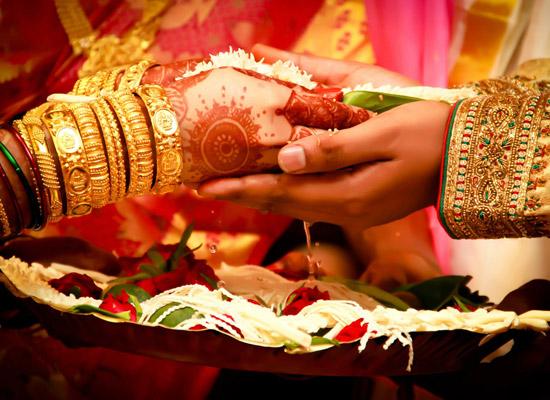About Us
Advertise With Us
RSS Feed | Content Syndication
Terms & Conditions
Privacy Policy
Contact Us
BollywoodShaadis.com © 2026, Red Hot Web Gems (I) Pvt Ltd, All Rights Reserved.

No one can truly celebrate the bond of holy matrimony like Indians do. And that is what attracts foreigners to not only add Indian elements to their weddings, but also have a complete traditional ‘Indian’ wedding. So, if you are a non-Indian, who loves the Indian culture, colours and celebrations, and if you want to get married in India, then this is a must-read for you. Here is a simple yet complete guide to tell you how to plan your D-day in this vibrant and vast country.
In India, the peak wedding season falls between November to February. This is not only the most auspicious time, but also a perfect time considering the weather. These months make the peak wedding season– with cool breeze that makes it a truly pleasant time to bring on the band, dhols, baajas, and of course the baraats.
However, a beautiful monsoon wedding in a hall with large windows that overlooks the rainy outdoors, sounds apt as well. And, if you can brave the heat during the summers in India, then there are a number of stunning outdoor and indoor locations for you to choose from, depending on your requirement.
Given the low-threshold that non-Indians have for the Indian heat and rainy season, a winter wedding would be just perfect for you.
Recommended Read: 5 Timeless Hairstyles that Look Good on Every Bride

Pre-planning and then pre-booking, is a must! Since the peak wedding season in India is limited to mostly four months, the best locations and venues get grabed very quickly, before you even know it!
So, if you want that perfect venue for your perfect day, start hunting for it six to eight months prior to your wedding, and book it as soon as you find it, which can also help you to get a good deal.
Continue reading below
Recommended Read: Unique Ideas for Indian Grooms to Make a Grand Wedding Entrance
Having an Indian wedding planner will help you plan and enjoy a stress-free wedding, just the way you want it to be. From decorations, gifting, shopping and dealing with designers, makeup and mehendi artists, and the booking of the venue to the arrangements for your guests, everything needs to be taken care! Let the wedding planners deal with all this. Also, they will lessen your burden of dealing with all the wedding vendors, and following up on the legalities as well.
Don't Miss: 6 Reasons to Hire a Professional Planner for Your Wedding

Rather than choosing the common cities like Delhi, Mumbai, etc., think different! They will make your D-day more exclusive and memorable for you and for others as well. The first step to decide the location is to know whether you want a beach wedding, a hill station wedding, a houseboat wedding, or maybe something more conventional.
The most popular spots for destination weddings in India are the beaches in Goa, the royal palaces in Rajasthan, Agra’s symbol of love (the Taj Mahal), Kerala’s backwaters, and Kashmir’s houseboats. Besides these, there are many other unique destinations where you can tie the knot, like Manali, Shimla, Mussoorie, Coorg, Pondicherry, and more.
Don't Miss: Top 3 Destinations for a Beach Wedding in India
Wedding costs in India really depend on what kind of a wedding you want, and the time of the year (wedding season or not). Indian weddings last for days, with many functions taking place prior and post the actual wedding day.
But truly, it is up to you. In fact, having small-scale weddings with a short guest list of close family and friends is the growing trend that you can opt for as well.

If you are getting married in India, then do add an Indian-touch to your wedding from the start to the finish. Welcoming guests with love, respect and proper tradition is of utmost important in India.
Have men or women dressed in colourful Indian attires, welcoming each and every guest with aarti and tikka, garlands, and ittr (perfume). This is because in India, guests are considered as Gods, and they must be treated in that way. You can also make an arrangement for special Indian dance performances at the entry gate of the venue. You can choose the dance style depending on your preference or the region in which you are hosting the wedding.
While they leave, thank each of them for coming, and give them a beautiful gift of significance, such as a diya or a mor pankh (peacock feather) painting. You can personalise these with the bride and the groom’s name or initials, wedding date and location.
Also Read: True Love Story of an American Woman who Found Her Soulmate in Rural India

The big fat Indian wedding is full of lights, colours, glitter, music and emotions. Whether it is the smell of the mehendi or the loud dhol beats, the Indian flavour is strong enough to make your wedding a once-in-a-lifetime experience.
For an Indian touch, go crazy with colours, traditional with music, and full-fledged with ceremonies. Use beautiful, fragrant flowers for decoration. There are particular flowers used for auspicious occasions, like marigolds, jasmines, and roses, which play a huge role in the Indian weddings.
You can also add colourful silk drapes, pillows and a low-seating to the decoration, along with rangolis, diyas and floating flower petals in water bowls, and chandeliers to add grandness to the traditional touch. Add some paneer tikkas and kebabs in your menu, and sweets like jalebi and gulab jamun. Now, put on some loud music, and dance on folk numbers and Bollywood tracks to celebrate a perfect Indian wedding.
Recommended Read: Best Bollywood Songs for an Indian Wedding

Whether you are having a Christian wedding or planning to take pheras around the holy fire, add Indian elements wherever possible. The bride can add Indian accessories like bangles, nose ring, kamarbandh, maang tikka, and more to the look. All the ladies, including the bride, can ditch the gowns and go for colourful lehengas and sarees. If not, then go for a fusion wear like a saree gown. Complete your look with a glittering bindi on your forehead.
As for the men, we suggest you should leave behind the tuxedos, dinner jackets, and bows and ties, and go for sherwani, kurta pyjama, mojris (Indian footwear), pagdi (Indian turban) and a colourful stole.

Now, let us tell you about the legal requirements about getting married here. To avoid any difficulties, it is best to hire a well-experienced lawyer to help you through the process.
To get married in India, some requirements need to be met, and some terms and conditions need to be followed, and therefore you must stay for at least 60 days in India to complete the procedure.
The couple will be required apply to the local registry to get married. You will need to go through “The Special Marriage Act” that governs civil weddings in India.
Either the bride or the groom is required to be living in the country for 30 days before applying for the wedding licence. The local police station, of the area where you are staying, will provide you with a certificate giving evidence of your stay.
What you need to submit to the registry office:
It is also important to have the evidence of marriage eligibility. After all the forms are filled and submitted, it will take about 30 days to get the legal sanction for the wedding to take place, provided that there is no objection during this period.
Also, three witnesses are needed, with passport-sized photographs, identity proofs and address proofs. Your marriage certificate will be issued a few weeks after the wedding.

Recommended Read: Stylish and Elegant Dressing Up Ideas for the Bride's Sister
Once all your questions about getting married in India are answered, you can get help in your wedding planning through India's only online wedding magazine- BollywoodShaadis.com, where you can find each and every detail related to Indian weddings under one roof. So time to get started, we say!
advertisement
advertisement
advertisement
